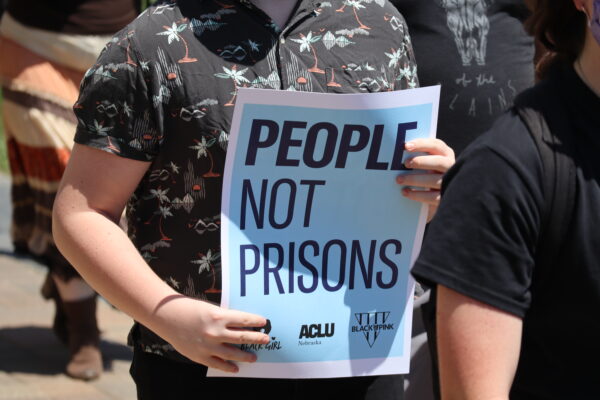LINCOLN, Neb. – The ACLU of Nebraska is calling for urgent, meaningful reform as Nebraska races toward the formal declaration of a prison overcrowding emergency.
This morning in a press conference, Nebraska Department of Correctional Services Director Scott Frakes announced he would certify Nebraska’s prison population at more than 140% on July 1, a requirement of state law that will officially recognize the overcrowding emergency that Nebraska has been dealing with for years.
In a joint event with Board of Parole Chair Rosalyn Cotton, Frakes indicated that the state plans to respond to the crisis by continuing to push for a new prison.
In response, ACLU of Nebraska Executive Director Danielle Conrad said Nebraska cannot afford to continue the failed experiment of mass incarceration, adding that the Department of Correctional Services’ own numbers show that Nebraska has not been able to build its way out of capacity problems in the last 40 years.
“Prison populations have dropped across the nation and in all of our neighboring states but Nebraska continues to head in the wrong direction because of the indifference of Gov. Ricketts and Director Frakes,” Conrad said. “For years, the Department of Correctional Services has asked for space and grace. Now that the clock has run out, their only idea is to funnel more taxpayer dollars into their department so they can build a new prison."
“As thousands of Nebraskans call for racial justice and a rethinking of every level of our criminal system, at a time when one out of every 10 Nebraska kids will have a parent in custody, this approach is disappointing and inadequate. Nebraskans need to tell Gov. Ricketts and lawmakers that we need to get smart on justice and we need to do it now.”
The ACLU of Nebraska advocates for smart justice reform, including sentencing reform, front-end diversion programs, increased prison programming and reentry support. If each reform in the ACLU’s Blueprint for Smart Justice was adopted, 3,000 fewer people would be in our prisons and Nebraska taxpayers would save an estimated $139 million annually.
Stay Informed
Sign up to be the first to hear about how to take action.
By completing this form, I agree to receive occasional emails per the terms of the ACLU’s privacy statement.
By completing this form, I agree to receive occasional emails per the terms of the ACLU’s privacy statement.

